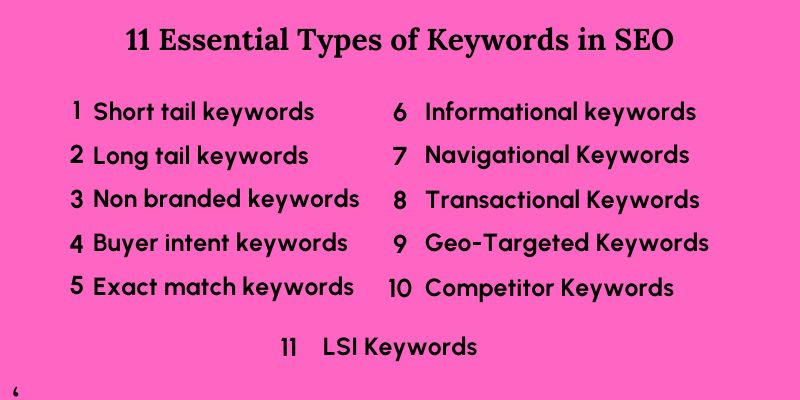Keywords are the main part of a good SEO strategy. They connect your content to what people are searching for online. Keywords help search engines understand your content and make it easier for users to find you. Using local keywords helps reach nearby customers. Informational keywords answer questions. Each type of keyword helps bring the right audience to your site.
A mix of keywords helps businesses reach people at different search stages. Use general, specific, and action-focused ones. This means your website can show up for a variety of searches, attract more visitors, and increase sales. But keywords are the key to getting noticed online and growing your business.
Importance of Keywords in SEO

Keywords are the backbone of SEO. They connect user queries with relevant content. Using different types of keywords can help businesses. It can boost their visibility, attract targeted traffic, and improve online performance. Here’s why every kind of keyword is essential for SEO success.
Driving Traffic with the Right Intent
Depending on user intent, each sort of term has a distinct function in drawing traffic. Informational keywords attract those seeking answers. Transactional keywords help convert ready-to-buy customers. Businesses can boost engagement and conversions. They should match their keyword strategy with intent. This will help them get relevant traffic at all stages of the customer journey.
Establishing Credibility and Trust
By using informative and LSI keywords, businesses can create rich content that answers users’ questions. It boosts the brand’s search engine ranks and its credibility as a source of information. This fosters client loyalty and increases industry authority over time.
Improving Local Visibility
Geo-targeted keywords are critical for businesses aiming to capture local audiences. With the rise of “near me” searches, businesses must optimize for location-based keywords. This helps them rank higher in local search results. This drives foot traffic to physical stores and connects local customers with relevant services.
Competing Effectively in the Market
Competitor and navigational keywords let businesses analyze trends and improve strategies. Targeting competitor keywords can capture shared audience interest. Navigational keywords reinforce brand presence and ensure users find official content. This prevents traffic loss to competitors.
Enhancing SEO Strategies with Precision
A mix of short-tail, long-tail, and LSI keywords lets businesses target a broad audience while focusing on specific niches. This comprehensive approach enhances content relevance, improves rankings, and drives consistent organic traffic. Here are 12 SEO steps for a new website. Keywords, when used strategically, act as the cornerstone of an effective SEO strategy, ensuring long-term growth and success.
11 Essential Types of Keywords in SEO

1. Short tail keywords
Short-tail keywords, also known as head terms, are short and broad search phrases consisting of one to three words, like “shoes” or “coffee.” They often have high search volumes because of their broad relevance. This makes them a popular starting point for users seeking information.
Short-tail keywords are very competitive. They often lack clear user intent. They might boost visibility and drive traffic. But, they are risky. The broadness of search results makes it hard to convert traffic into actions. Consumers may be looking for multiple results from a single query.
To use short-tail keywords well, businesses should pair them with SEO tactics and quality content. This will direct consumers to more specialized topics. These keywords are key to a digital marketing strategy. They boost brand recognition and attract large audiences.
2. Long tail keywords
Long-tail keywords are longer, specific search phrases. They usually have three or more words. Examples include “Best-SEO tools” and “How to Brew French Press Coffee.” They target niche audiences with clear search intent. So, they are ideal for driving relevant traffic and conversions.
Long-tail keywords are easier to rank for in search engines. They have less competition and lower search volumes than short-tail keywords. Its uniqueness lets companies engage customers further in their decision-making. This often leads to better engagement and a higher ROI.
To use long-tail keywords well, businesses must create content that answers users’ questions. These keywords are very helpful for small firms or niche markets. They boost search engine visibility and attract the right audience.
3. Non branded keywords
Non-branded keywords are search terms that exclude specific brand names. They focus on generic words related to products, services, or topics. For example, “running shoes for men” or “affordable laptops” are non-branded keywords. They target users who are exploring options without brand loyalty.
These keywords are key to reaching new, unfamiliar audiences. They are searching for solutions you offer. Non-branded keywords attract users in the research phase. They are a powerful tool for increasing visibility and discovery.
Businesses must optimize their content to use non-branded keywords. It should match user intent and provide valuable, relevant information. They are vital for competing in a broad market and building awareness. This is especially true for smaller brands. They aim to attract new customers and build credibility.
4. Buyer intent keywords
Buyer intent keywords are search terms used by people ready to make a purchase or take action. These keywords often include phrases like “buy,” “discount,” and “best price.” They may consist of specific product names, like “buy SEMrush online.” They signal that the user is close to buying and seeking solutions or deals.
Targeting buyer intent keywords is crucial for driving conversions and sales. By aligning content, product pages, or ads with these keywords, businesses can attract high-value customers who are ready to act. This strategy boosts ROI. It ensures marketing meets users’ urgent needs.
5. Exact match keywords
Exact match keywords are specific search terms that exactly match the user’s query, providing highly targeted results. For example, if your keyword is “best hiking boots,” your content or ad will only show that exact phrase or very close variations. This precision helps attract users with a clear intent.
The best way to maximize conversion rates and attract relevant traffic is to use exact-match keywords. These keywords are effective for companies looking to reach a certain audience because the search intent is well-defined. However, their focus on certain phrases may limit traffic. More general keywords attract more visitors.
Businesses should focus on their audience’s needs. They should create content or ads that answer those needs. This will maximize the use of exact-match keywords. Exact match keywords can yield high-quality leads. So, they are vital to a focused PPC or SEO campaign. But, they need careful planning.
6. Informational keywords
Informational keywords are search terms. Users seek knowledge, not to buy. Examples include “how to do keyword research” “benefits keyword research in SEO,” or “what is digital marketing.” These keywords are focused on learning and discovery, making them ideal for attracting users in the early stages of their journey.
Targeting informational keywords is essential for businesses aiming to build trust and authority. Companies can engage their audience. They can do this by creating valuable, educational content around these keywords, like blog posts or videos. This will position them as reliable sources of information. This approach helps nurture relationships that may lead to future conversions.
Informational keywords don’t often lead to sales. But they are key for driving traffic and boosting brand visibility. Businesses should use these keywords. They should create high-quality, engaging content that answers user queries. This will foster trust and guide users deeper into the customer journey.
7. Navigational Keywords
Users who know where they want to go on the internet employ navigational keywords. These keywords often include brand names, websites, or services. Examples are “Nike store” and “Facebook login.” They show the visitor wants to skip broad search results and go to a specific brand or webpage.
By using navigational keywords, businesses can help customers find official content. This will also boost their brand presence. They work best for well-known brands, though, and might not be as helpful for startups or obscure companies.
8. Transactional Keywords
Transactional keywords signal an intent to complete a specific action, like making a purchase, signing up, or downloading. These keywords often include terms like “buy,” “order,” or “download.” An example is “buy smart TV online.” They are high-value keywords, attracting users ready to convert.
Businesses targeting transactional keywords should optimize product pages. They should also improve calls to action and paid ads. This will help capture motivated users. This approach is ideal for driving sales and achieving measurable ROI from search marketing efforts.
9. Geo-Targeted Keywords
Geo-targeted keywords are location-specific terms, like “restaurants in New York” or “plumbers near me.” They are vital for businesses seeking local customers or providing location-based services.
Using geo-targeted keywords, companies can reach local audiences. It will boost their visibility in local search results. It’s vital to optimize for these keywords and use local SEO. It will attract relevant traffic and increase footfall for local businesses.
10. LSI Keywords
Latent Semantic Indexing (LSI) keywords are terms related to the main keyword. For example, “running shoes” is linked to “athletic footwear” and “marathon gear.” These keywords help search engines find your content’s topic and relevance.
Using LSI keywords boosts content quality and SEO. It makes your work more comprehensive and context-rich. They ensure you rank for a broader range of related searches while avoiding keyword stuffing.
11. Competitor Keywords
Competitor keywords are search terms your competitors are targeting to attract traffic. These can include branded or non-branded keywords that drive users to their sites. Identifying and leveraging these keywords can help businesses compete for the same audience.
By analyzing competitor keywords, businesses can improve their SEO. They can fill content gaps or create campaigns to capture a shared audience. This approach allows for better positioning and differentiation in a competitive market.
Which Keywords Should You Use in SEO?
To choose effective SEO keywords, focus on relevance to your content, search volume, and competition level. Use tools like Google Keyword Planner to find popular terms. Consider long-tail keywords for more specific targeting and less competition. Regularly update your keyword strategy based on performance analytics.
FAQs About Keywords in SEO
1. Why are keywords important in SEO?
Keywords are essential in SEO because they help search engines understand your content and match it to user queries. Targeting the right keywords will attract relevant traffic. It will improve visibility and drive more conversions.
2. What’s the difference between short-tail and long-tail keywords?
Short-tail keywords are broad and general, often with high search volume but low specificity (e.g., “shoes”). Long-tail keywords are more detailed and specific (e.g., “best running shoes for women”). They are ideal for attracting targeted traffic and improving conversions.
3. How do geo-targeted keywords help local businesses? Geo-targeted keywords focus on location-specific searches. Examples are “coffee shops in Boston” and “plumbers near me.” They help local businesses rank higher in search results. This attracts nearby customers and boosts foot traffic.
4. What are LSI keywords, and why are they important? LSI (Latent Semantic Indexing) keywords are related terms. They provide context to your main keyword. They help search engines understand your content. They improve rankings and ensure your material is relevant and thorough.
Final thoughts
Keywords are the heart of SEO, helping your content connect with the right audience at the right time. Use keywords wisely to boost your site’s visibility. This will attract more visitors and improve your chances of success. Using the right keywords is key. It helps you reach local customers, build trust, and drive sales. It makes your content stand out and delivers results. Start optimizing today to grow your online presence and achieve your goals!
